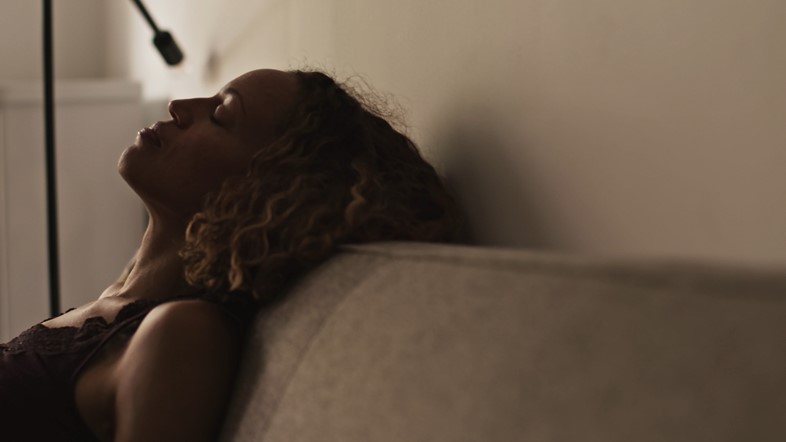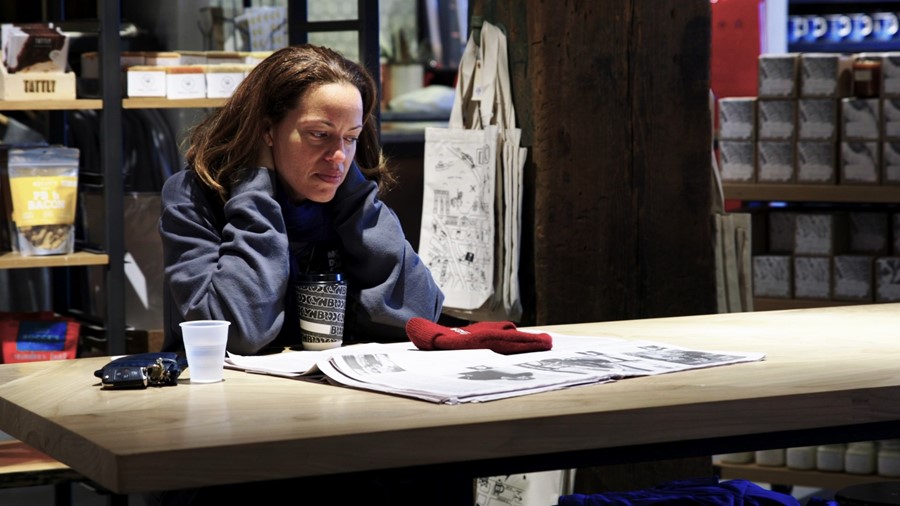On the Record traces the unique experiences of black women in the #MeToo movement, via those who have accused Def Jam Records founder Russell Simmons of sexual assault
In Helen Benedict’s 2007 feature for Salon magazine, Abbie Pickett, then 24 years old and a specialist with the 229th Combat Support Engineering Company, explains that Camp Arifjan – a US military base in Kuwait, during the Iraq War – was so dangerous for women, soldiers gave the station its own nickname. “They call [it] ‘generator city’,” she said, “because it’s so loud with generators that even if a woman screams she can’t be heard”. Another soldier, Mickiela Montoya, aged 21 at the time, talked of carrying a knife with her as she moved about the base. “The knife wasn’t for the Iraqis, it was for the guys on my own side,” she told Benedict.
The stories Abbie, Mickiela and a host of other women shared in Benedict’s article caught the attention of filmmaker Amy Ziering. “I walked straight into Kirby [Dick]’s office and said, ‘this is crazy!’” remembers Ziering. “We couldn’t believe it. We started investigating and found out that the situation was far worse and far more extensive than anyone knew or had imagined.” Thus, Ziering and Dick began filming their Academy Award-nominated, Emmy-winning feature The Invisible War. A documentary about sexual assault in the military, it was only the beginning of a decade-long journey that would lead the duo to confront sexual assault on college campuses (The Hunting Ground) and in the entertainment industry, most recently in the 90s hip-hop scene with new film On the Record, which premiered online this week. On the Record highlights the unique experiences of black women in the #MeToo movement, centring on the stories of those who have accused record executive Russell Simmons of sexual assault (Simmons himself denies all allegations).

Pitching The Invisible War for financial backing was not an easy sell, remembers Ziering. “A female executive at a very progressive, very well-known distributor said, ‘no one wants to hear stories about women being raped. And no one certainly wants to hear stories about women being raped in the military’,” Ziering recalls. “She articulated it that way but we were turned down everywhere.” “There was a real societal repression of this being a significant issue,” says Dick. “People didn’t want to think about it.”
They persevered, finished their feature and began screening it at festivals and on college campuses. After several months, while working on a different project for HBO at the time, Ziering and Dick suddenly began receiving an avalanche of letters and impassioned pleas for help. “Students started writing to us saying, you don’t need to go to the military, please talk about what’s going on here,” remembers Ziering. Once again the pair began investigating, reporting intimate stories and personal testimonies that would eventually become The Hunting Ground. When the film was nominated for an Academy Award in early 2016, Lady Gaga took to the stage in front of a crowd of actors, filmmakers and Hollywood executives to perform Til It Happens To You. At the song’s closing verse, a stream of sexual assault survivors took to the stage each with a message of defiance, strength and support inscribed in large, black letters on their forearms. On October 5, 2017, roughly 18 months later, Jodi Kantor and Megan Twohey would break the story of Harvey Weinstein’s sexual harassment in The New York Times, accelerating a burgeoning #MeToo movement.
“When #MeToo happened it was surreal,” recalls Ziering. “We’d been long in the trenches working very hard on this issue for a very long time. I never thought anything like that was remotely possible.” As they started to receive more and more new leads, a filmmaker friend – director Liz Garbus – reached out to introduce Ziering and Dick to Drew Dixon, once a rising star in Def Jam Records’ A&R department. “At that time she didn’t know if she wanted to speak on the record in any way,” says Ziering. “I said, ‘let’s do the interview, see how it goes, no harm, no foul and if you don’t want us to do anything with it that’s totally fine.’” Struck by the power of Dixon’s story, and motivated to examine the issue of sexual abuse from a more intersectional perspective, the pair took a rough cut to the film’s then-producer, Oprah Winfrey, for her advice on how best to proceed. “Race plays a unique role in this trauma for women of colour,” says Ziering. “It’s a huge factor in the way they have to contend with it. We never would have embarked on this film without that kind of partnership.” Winfrey was unequivocal in her support. “She watched the cut and said ‘Yes, I totally get it, this needs its own space and room to breathe.’” (Earlier this year, Winfrey – who was set to make the film her first project in a collaboration with Apple – controversially pulled support from the film, citing creative differences and that she believed more work was needed to “illuminate the full scope of what the victims endured”. On The Record was subsequently picked up by HBO Max.)
Dixon’s story – and the stories of Sil Lai Abrams, Alexia Norton Jones, Jenny Lumet, and Sheri Sher featured in On The Record – make for powerful, uncomfortable but necessary viewing. Examining the challenges women like Dixon face when deciding to go public about their experiences, On The Record spotlights the unique difficulty facing women of colour who’ve experienced sexual assault. As Joan Morgan, author of When Chickenheads Come Home To Roost, explains in one of the film’s most poignant moments, black women, wary of reinforcing the fatal stereotype of black men as sexual predators, sometimes “allow race loyalty to buy them an early tombstone”. In many ways the culmination of a decade of reporting, On The Record deepens and develops our understanding of the trauma of sexual assault in profound new ways. “I’m so grateful to these women for their courage,” says Ziering. “Many, many people who’ve seen the film say they’ve never thought about these issues in this way. They never understood the additional burdens women of colour have when they’re victims of these kinds of crimes.” As for the next ten years, and what it holds for the two filmmakers, the fight for justice continues. “Power sees progress as oppression,” says Ziering. “We’ve got to buckle up and keep going.”
On The Record is available on demand from June 26, 2020.
